lilinx.com's blog
Sounds of dystopia (part. ½)
Sat, 01/13/2018 - 02:43 — lilinx.comCrossposted from http://reaganyears.tumblr.com/
The current visuals of Reagan Years are not satisfactory enough to be shared. I am not exactly sure what will be the visual feeling of the game. However I think I’ve made some progress as to identify the kind of soundscape I will use.
Here I would like to present the main directive principles I am using when designing the audio environment of Reagan Years. First of all let’s have a look at how it’s done in some other games.
Videogame tries hard to be the Total Art
From my experience, most videogame designers tend to flesh-out the user experience by establishing an atmospheric coherence between the visuals, the sounds, and the content they are trying to deliver.
An outstanding example of this is Beeswing where the imperfection of acoustic music and hand-drawn visuals really help the game to carry its message on the nature of memories : precious, volatile, fragile, powerful, intimate, etc.
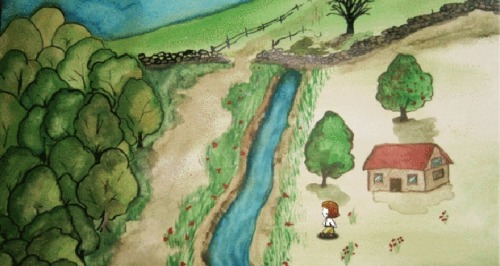
Videogame is a medium that nourishes fantasies about finally achieving the ambition of total art, and it seems this constant research of atmospheric coherence between visuals, sounds and contents is part of this. I am sure it would be worth exploring the limits of this tradition, but given the other ambitions I have for Reagan Years and my doubts on whether I can achieve them, I think I will try not to walk too much on the path of formal experimentation here.
Cold War is a period that quickly bring atmospheric tropes to the mind. Let’s discuss some of them and see why I don’t want to use them in my game.
Looking for my Cold War Feel
The reality my game aims at depicting is bleak, because it is the reality of geopolitical decisions, coming with their load of cynicism, and contributing to the perpetuation of dynamics of brutal dominations both between countries, and within countries. And somewhat I also want the player to establish connections between the state of the world in the 80′s and the state of the world today.
Nostalgia for a golden age
I certainly do not want to give in James-Bond like nostalgic clichés of men wearing elegant suits, driving nice cars, women sitting at the typewriter, and everybody living the last authentic adventures against a clearly identified evil enemy, in a world threatened by cold modernity.
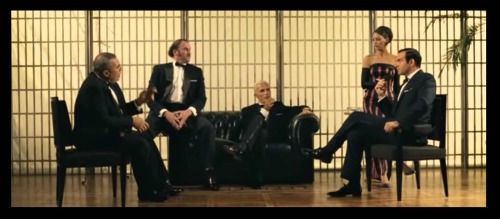
Well, anyway, Reagan Years takes place in the 80′s, so it would definitively be out of place.
The bleak, the gray, and the rusty
Then you have the exact opposite : dystopian universes made of out-dated machinery, rusty buttons, hollow sounds of cringing metal, black-and-white propaganda films, and tense music annoucing the imminent nuclear apocalypse. A depressed-looking, grey-wearing spy walks away from a crime scene.
Look at this (promising but abandoned) East VS West, it looks obscure as hell and even the names of the countries are typewrited on the map. How depressing.
https://www.youtube.com/watch?v=1elh4mxqvDo
If you follow this trend, you end up with the universe of Paper, please : a bleak gray soviet universe where it seems that color is now illegal. Even the voices of humans have a metallic quality, and the music is of course, a military march.
https://www.youtube.com/watch?time_continue=99&v=_QP5X6fcukM
In games like these, the world already looks regressive and devastated. It’s like you live in the universe of Fallout even without the bomb actually exploding.
Clinical neatness, deadly decisions
Then you have the approach of DEFCON, which favors neatness over decay. It gives you some distance from the horrors of the game you are playing. The interface has a high-tech clinical reality to it. It looks like you are sitting in a heavily equipped (and protected) futuristic secret bunker, where you take decisions causing millions of death (these figures appear as minor info in the game’s UI). This is a nice approach to represent the disconnection of the political power from the consequences of its own actions on the populations of the world. I guess it’s influenced by movies such as Wargames.
In DEFCON, sounds are clinical, muffled, informative. The music is minimalist and menacing.
https://www.youtube.com/watch?v=mCpVpIBqaJg
The music is minimalist and menacing.
Another example of this is Neocolonialism (obvisously influenced by Defcon and making use of the same kind of aesthetics, this time not to depict nuclear war, but economical warfare). Neocolonialism does not only make use of robotic sounds, you can also hear more fleshed-out string melodies, but the dissonances they play with heavily contribute to the depiction of a world where “something is wrong”.
https://www.youtube.com/watch?v=4tjShfAt3rI
My choices for Reagan Years are influenced, yet different, from those described above. But this is something I need to describe in another article.
Why is "The Reagan Years" about the Reagan Years?
Wed, 01/10/2018 - 13:19 — lilinx.comSome notes about how I decided to restrict (for the moment) the scope of my game to the point of view of USA in the 1980′s.

Historical data VS historical process
In his book about Balance of Power, Chris Crawford states that “data is not the main element in realism - process is. […] The actual amount of GNP of Ghana is less important, for the purposes of a game on geopolitics, than the manner in which GNP changes with time”. Crawford’s game is all about depicting the global mechanics of superpower competition in the cold war era. He mainly intends to make a point about the dangers of warmongering, taking a pacifist stance that he feels is needed in the context of the 80′s.
The opposition drawn by Crawford between data (historical facts at time T) and processes (dynamics applied to this data) is problematic when we come to terms with its practical applications in game design. Since he is not aware of the imminence of the USSR collapse, Crawford sets up a game running from 1985 (the then-present time) to 1997. He makes the statement that “the principles [of geopolitical interaction] have not changed fundamentally since the introduction of the nuclear-tipped ICBM”. This also leads him to claim that his game system could relevantly depict former periods of the cold war, for example the 60′s. According to him, to do this, only the data would need to be adapted, while the game’s processes would stay relevant.
Cautiously restricting my game’s historical scope
When I started developing Reagan Years, I intended to create a modern version of Balance of Power, introducing only minor changes in the game’s data and in the user interface. I immediately realized that the historical scope of the game would need to be redefined. It would be odd for a modern game to depict a USA-vs-USSR competition running till 1997. I therefore started to consider other relevant periods of the cold war. However, going through this preliminary process of selection has led me to question Crawford’s assumptions on the permanence of geopolitical principles through the entire 1945-1990 period.
Here are some of the questions I ask myself at this stage: isn’t Balance Of Power a reflection on the USA international policies during the 80′s, rather than a depiction of global dynamics for a near-50 years period ? Is it historically relevant to consider that USA and USSR geopolitical points of view were symetrically opposed, like those of two chess players? Had this game been designed in USSR during the 80′s, what kind of global dynamics would it have depicted? And if today’s mainstream depictions of this era are all about USSR-USA competition, is it because the accuracy of such a model, or merely because history is written by powerful dominant powers?
It will take a lot of research and thinking before I finally adopt a satisfying stance on these questions and find a way to reflect this stance in my game’s design. Meanwhile, it seems safer to restrict the scope on which the historical principles of my game apply. Therefore, I have decided that the game will only depict the years of Ronald Reagan presidency (1981-1989), and that it will only depict the point of view of the USA. This will apply until I have the safe feeling that my game’s dynamics can relevantly apply to other countries and eras.
A system aware of its own limitations (in-game events) - 29/12/2017
Wed, 01/10/2018 - 13:14 — lilinx.comWith a new job, the holiday season and moving out, plus other personal projects coming in the middle, I certainly did not find the time to finalize alpha 0.4.2, which is supposed to be the first playable Alpha of Reagan Years. However, it is also a nice occasion to take some time and reflect on my ambitions for this project and about the core gameplay concepts I want to implement.
All these things I can’t depict faithfully
I have written previously about how I decided to restrict the scope of my game in terms of historical period (the 80′s) and in terms of the player’s point of view (USA). The fact is, if it was to prove relevant, I could easily disregard these limitations in the future. If I saw fit, I could quickly design a 1960′s scenario, or make USSR playable.
But the system I am designing also comes with limitations that I foresee will be difficult to overpass. At the moment, I am especially concerned about the inclusion in my game of historical dynamics such as social struggle, class conflict, intricate internal politics, cultural war and the role of propaganda, political ideologies, trade and economics, international law and human rights, international organizations (such as the UN), non-governmental bodies (especially multinational corporations), and last but not least, the geopolitical agendas of the so-called minor powers (that is, every country beside USA and USSR).
Some of these elements might be reflected in the game system, however, I already know I will not be able to emulate them in a satisfactory way. This is due to a number of factors, among which : my lack of skills, the complexity of the matter, the need to maintain clarity, playability, and accuracy. Sometimes I may find the solutions, sometimes not.
“We win, they lose” : a simple point of view
Hopefully, I am not yet suffering from Borgeso-Perecian madness. I do not pursue the vain ambition of including the whole reality of the 1980′s in my game. I know I have to make choices, and I just need to make sure these choices are relevant to what I want to achieve.
In theory, I just need to be satisfied with the result. But my problem is I can’t be satisfied with the result because I strongly believe that a game system will anyway always be a very poor representation of the reality. I can’t summarize the history of mankind in the 1980′s in a playable game system. Maybe other people can, but they haven’t done it yet in a way I would accept to mimic.
Therefore, all I decide to do is to create a game system that represents a rather simplistic point of view. That’s what Reagan Years is about : the point of view promoted by Ronald Reagan during his presidency. “Here’s my strategy on the Cold War : we win, they loose.” said Reagan (1977). Hey, that’s simple enough to be put in a game! Let’s do it.

Videogame history is rich with strategy titles taking a limited point of view. You have Civilization that is like a playable version of Fukyama’s End of history. You have Crisis in the Middle East where the only role expected from the player is to establish Israel’s regional supremacy. You have Age of Empires that depicts a fantasized, over-simplified middle-age that looks like a Errol Flynn’s flick.
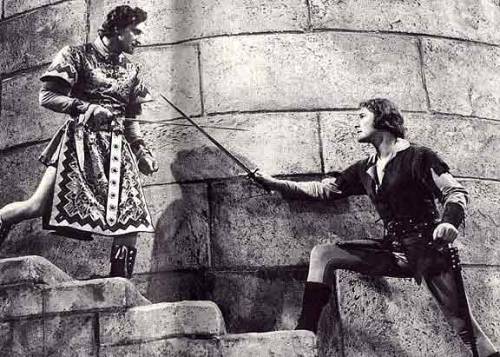
All these games are problematic, not only because they adopt a simplified point of view, but also because they refuse to question it. Actually, they even refuse to acknowledge the existence of their own biases.
A good example of this posture is demonstrated in the promotion of the game Vietnam ‘65. This game’s description on Steam totally give in to the US’ army rethorics : “killing the enemy is only a secondary mission. Most of your efforts and resources are spent elsewhere trying to grab the Hearts & Minds of the local population”.
But that’s not all. The developer’s page also claim that “this is a game that captures the true essence of the Vietnam war”, quickly disregarding the possibility that you could look at this war with other glasses than those provided by the US commandment.
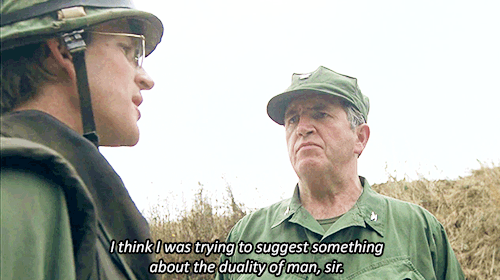
So, how am I to create a grand strategy game that question its own point of view? Let’s turn to Crusader Kings for inspiration.
How Crusader Kings breaks its own rules
I will certainly write other posts about the Crusader Kings series, since these games are a major inspiration of mine. So let’s not get into the details of these games now. Suffice to say the ambitions of the developers toward historical accuracy were exceptional as per the videogame’s industry standards (I admit these standards are low). But the most inspiring thing about CK design is not its tremendous complexity, or the amount of research done ahead of the development. The most inspiring thing is : the game aknowledge that its own so-called “complex” system is worth peanuts when faced with the reality it aims to depict.
This is very cleverly pointed out by Jason Pitruzello in his article Systemizing Culture in Medievalism. Pitruzello explains how unusually complex are the cultural mechanisms in this game, while still deploring their limitations.
Clearly, there are limits to the nuances of the game’s cultural mechanics. […] it might appear that Crusader Kings does not really provide a better medieval experience for its players because, although culture can transfer between rulers and the provinces they rule, culture remains unchanging and static. […] However, the game’s designers include one exception to their own rules that indicates that they understand the limits of their own work. In recognition that cultural change need not simply shift from one culture to another, the game comes with an "English melting pot” cultural change event. This cultural conversion event bypasses the mechanics I outlined above.“
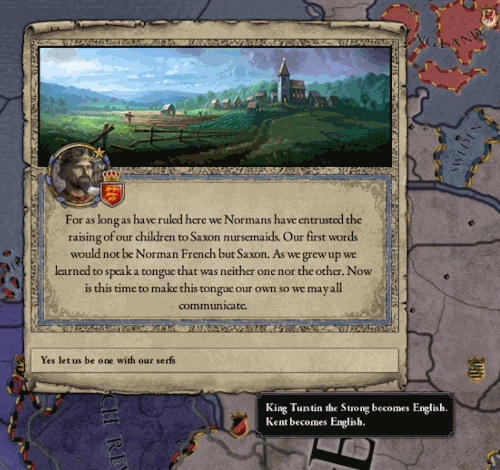
Narratives VS the system
Had I not stumbled across this article, I would probably never have started to develop Reagan Years This piece of criticism greatly clarified some of the vague ideas I had on the paradoxes of so-called realistic game systems, but it also pointed out to an excellent example of how I could expect to surpass these paradoxes.
This is how I plan to practically apply all this theory to my game:
The game system will depict a limited point of view : the world’s geopolictics are binary. The main objective of the USA is its own supremacy and the defeat of USSR. Outside of their pro-USA or pro-USSR agenda, the behaviour of other countries is of little interest.
But this limited point of view, reflected in the game’s main rules, will also be challenged by the game’s narratives. At the moment, I mostly plan to use an event system to achieve this (events are also a beloved core feature of CK). The events will cover things that are not represented in the game’s main system. Events will be used both as narrative moments of the game (texts to read) and exceptions to the game’s rules (altering mechanics).
The event system will also allow other narratives to emerge in the game. For example, the game is extremely binary (USA vs USSR) in its nature, but events will pop up to present the point of view of other countries, of other groups, and to remind the player that while playing a Reagan’s game, he is playing “with blinkers on”.
The events will also be used to reposition the ordinary life of human beings at the center of an otherwise very abstract game system. For example, they will be used to narrate the consequences of the player’s strategic actions on the lives of simple citizens.
My game, drifting away (19/12/2017)
Wed, 01/10/2018 - 13:08 — lilinx.comOver the course of the last three weeks, I have been working on a rough Alpha version of a grand strategy video game. The game is depicting the geopolitical tensions of the cold war.
Players impersonates the political leaders of USA and USSR. Their objective is to increase the global influence of their country, at the expense of the opponent, while avoiding a nuclear confrontation.
My initial objective was to create a modern version of Chris Craword’s Balance Of Power, a classic game released in 1985. Although I have only seldomly played it, I have been fascinated by that game for many years now. This fascination originates not only from the structure and content of the game itself, but also from the ideas presented by Crawford in the game’s manual and in a book detailing his design choices.
Unfortunately, Balance of Power is not playable on modern platforms. By creating a modern version of this game, I originally intented to adress the following questions : if this game was played today, what could it teach us? Would we find it relevant, fun, useful, accurate, sensible? Could the revival of a half-forgotten classic from the 80′s be a valuable contribution to our contemporary world?
However, after less than a month of work on a basic game engine, I have already started to drift away from the perspective of a mere “modern port” of BoP.
This devlog will document this “drifting away”.
I guess I'll crosspost my new devlog here
Wed, 01/10/2018 - 13:07 — lilinx.comHey, in December I had some time and motivation so I started again to develop something. It's been in standby for about a month now. In order to keep my motivation and order my thoughts about this project (which is unusually ambitious compared to the small games I've done few years ago) I started to write my thoughts at http://reaganyears.tumblr.com/ ... it looks nice... But Tumblr is not so cool to engage conversations...and I like GT with all my heart...so I'll crosspost my devlog here for you guys to comment if you feel like it. Not sure where all of this is going so far. But that's how we like it, don't we.
Interesting discussion about five of my games
Sun, 03/15/2015 - 04:26 — lilinx.comHi all, I haven't be very active on GT lately, mostly due to a job that leaves me with very little free time at the moment.
However, I would like to invite you all to a feedback conversation about 5 of my games (most of them were published on GT).
that is taking place on the makega.me forum
There :
http://forum.makega.me/t/five-games-i-made-in-2013-2014/
I'm enjoying reading the discussion for 1000 different reasons and I would surely enjoy to find your feedback added there, be it negative, positive, neutral, short or extensive, whatever, if my work is meaningful to you in any way please join in :)





